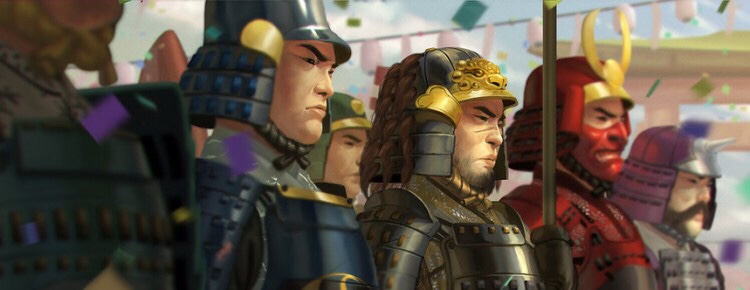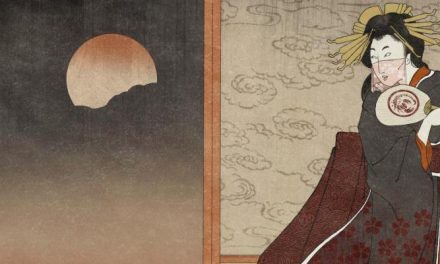Perhaps the result of years in the theatre, perhaps from my love of fantasy adventure novels, a very common theme in the role-playing games I run is the conflict between what a character should do and what they want to do. While applicable to almost any setting – even bog-standard adventures in Dungeons and Dragons – there’s no setting I’ve played in where it’s more appropriate than that of Rokugan, from Legends of the Five Rings.
Though a fantasy setting, filled with swords and spells and monsters, the game itself draws from Chinese, Japanese, and other Asian cultures and mythologies. Most all playable characters are samurai, noble servants that help police the lesser classes while paying homage their betters. One of the biggest themes running through the game is that of Bushido, and how each of the various Clans approach its tenets. Sometimes disagreements about interpretations or practices lead to all-out war, so very central is the concept of Bushido to the fictional society and (almost) every character therein.
Most samurai (in this setting) largely hold to Bushido as a guiding principle, but not necessarily something that directs their every action. On either end of the spectrum however are those who take their adherence or denial of the philosophy to extremes. It’s easy to see how, in a regimented society, acting contrary to the accepted social order would brand one an outsider, but it doesn’t take much more imagination to see how someone who follows the exact letter of the (at times contradictory) law could be as problematic.
Imagine a police officer who adamantly adheres to every rule in the vehicle and penal codes, and expects everyone else to do the same. Citations and arrests would be constantly enforced for driving one mile over the speed limit, parking more than 18″ from a curb, jaywalking, throwing a Frisbee without the permission of a lifeguard (yes, really), using a bathroom with the window open (yep, a law), and even using a garage as a storage space (also a crime). That person would be detested by the citizenry and fellow officers alike, largely by violating the unwritten social construct that many laws are silly or impractical.
With Legends of the Five Rings, characters can be anywhere on this scale of moral adherence to Bushido, from ignoring it completely, paying lip service, thinking it’s a good idea, or using it as the unwavering source of truth. While playing on the low end of the scale presents its own problems, today I want to focus on those who find themselves trapped between what society says is right and what their heart feels.
A core lesson in drama is that conflict breeds action – someone getting and then eating a cookie doesn’t make for a good scene, but someone having to decide whether to selfishly eat the last cookie or selflessly give it to their dying spouse would certainly be dramatic. Conflict breeds action, interest, and ultimately, story.
Because this can be an esoteric topic, I want to provide some examples, taken directly from role-play sessions of the past that may help illustrate where I’m coming from:
- A soldier is responsible for the slaughter of an entire village, under orders from above. He is publicly congratulated and promoted for his deeds, but inside feels a deep horror at his own actions clawing at his heart.
- A samurai is told that her husband is a traitor to the family, but that the revelation of this fact would bring scandal upon the whole house. She is to execute him and falsely claim he was killed in a hunting accident. She loves her husband – how does she ultimately react?
- Proper samurai do not eavesdrop, and if they do accidentally come into compromising information, are supposed to completely ignore it. What if a guard overhears the lord’s guests plotting a coup? Does he break protocol to maybe save his lord’s life? What if he’s wrong?
- One soldier suggests a ruse to gain the upper hand in an upcoming skirmish, while another thinks the idea is underhanded and abhorrent. Who is “right” and how does that change their relationship?
Long ago, I read a number of gaming articles written by John Wick, one of the minds behind the L5R setting. A contentious figure, he often used elements of a character’s story or personality that they held most dear as a lever to drive discord, in order to tell an engaging story. Some gamers hated his style, calling it “antagonistic” to the players. Others loved it, because it presented a more three-dimensional role-playing experience that they couldn’t find elsewhere – it has been said that “no one forgets a John Wick chronicle.”
In his writings, Wick explained that he felt the archetypical super hero-type protagonist was boring and unrealistic. Only having flaws when plot demanded it, never tempted by evil, and always ending up the victor, he felt the characters were little more than cardboard stand-ins for fantasy wish fulfillment. Such, he decided, was not going to be the way his games ran.
Perhaps without taking as full a draught from the cynicism bucket, I agree that too often protagonists are presented as flawless – and infallible – super-beings, and I too find those stories boring. To me the meat of a story, which ultimately gaming sessions are, is based out of realistic conflict and contrast – characters wanting different things. Hence, in games like Legend of the Five Rings, there is the perfect opportunity for me as the game-master to remind players that every action their characters take has consequences, either personal or societal. I’ve been very lucky to play with and run games for a relatively stable group of mature adults who enjoy those twists and turns, the internal character dilemmas and conflicted loyalties.
Because I don’t solely want this post to be about L5R, and want to make sure the material is relevant to all game masters, here is how I may present this internal or external conflict in other games:
- A Lawful Good priest of the sun discovers that his religion’s rules are directly at odds with those of a village he just saved. Does that necessarily make the village evil? What does that mean for his rescue of them?
- A nihilist who believes that nothing truly matters discovers an otherworldly evil that turns her stomach and twists her very sense of right and wrong. How does she reconcile her beliefs with her experience?
- The character swore to never do Y but discovers that only by doing Y can they save the day – which wins out, their convictions or their goals?
We see these kind of scenarios, especially that last one, played out in movies and television all the time. Older action stars are often cast in roles where their characters risk having to betray their “one rule” in order to get the job done. When we apply the same kind of thinking – the plot devices that the players write into their own back-stories – I feel it makes for a much more engaging, personal, and memorable experience for all involved.
Happy gaming!















